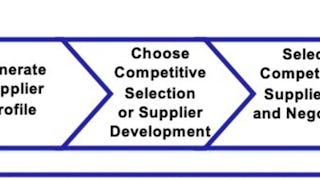- Browse
- Exploratory Data Analysis
Results for "exploratory data analysis"
 Status: Free TrialFree TrialJ
Status: Free TrialFree TrialJJohns Hopkins University
Skills you'll gain: Request for Proposal, Conflict Management, Presentations, Technical Communication, Storytelling, Persuasive Communication, Communication Strategies, Organizational Strategy, Non-Verbal Communication, Proposal Writing, Business Communication, Team Building, Interpersonal Communications, Intercultural Competence, Verbal Communication Skills, Target Audience, Team Management, Business Writing, Strategic Communication, Strategic Thinking
4.8·Rating, 4.8 out of 5 stars56 reviewsIntermediate · Specialization · 3 - 6 Months
 Status: NewNewStatus: Free TrialFree Trial
Status: NewNewStatus: Free TrialFree TrialSkills you'll gain: Cryptography, Model Evaluation, Exploratory Data Analysis, Event-Driven Programming, Encryption, Server Side, Web Development, Regression Analysis, Apache, Web Services, Machine Learning Algorithms, Classification Algorithms, Data Preprocessing, Public Key Cryptography Standards (PKCS), Web Scraping, Natural Language Processing, Web Applications, Key Management, Python Programming, Predictive Modeling
4.9·Rating, 4.9 out of 5 stars62 reviewsBeginner · Specialization · 3 - 6 Months
 Status: NewNewStatus: Free TrialFree TrialU
Status: NewNewStatus: Free TrialFree TrialUUniversity of Illinois Urbana-Champaign
Skills you'll gain: Wealth Management, Estate Planning, Portfolio Management, Real Estate, Investments, Financial Industry Regulatory Authorities, Commercial Real Estate, Regulatory Compliance, Asset Management, Tax Planning, Finance, Risk Management, Return On Investment, Financial Analysis, Business Strategies, Strategic Planning, Business, Data Management, Financial Statements, Failure Analysis
4·Rating, 4 out of 5 stars10 reviewsIntermediate · Specialization · 3 - 6 Months
 Status: PreviewPreviewU
Status: PreviewPreviewUUniversidad Austral
Skills you'll gain: Technical Analysis, Digital Assets, Investments, Blockchain, Portfolio Management, Market Trend, Financial Analysis, Market Data, Asset Management, FinTech, Operating Cost, Decision Making, Risking
4.8·Rating, 4.8 out of 5 stars120 reviewsBeginner · Course · 1 - 3 Months
 Status: Free TrialFree TrialU
Status: Free TrialFree TrialUUniversity of Michigan
Skills you'll gain: Manufacturing Operations, Production Planning, Digital Transformation, Technology Strategies, Business Modeling, Product Lifecycle Management, Internet Of Things, Simulation and Simulation Software, Emerging Technologies, Real Time Data, Trend Analysis, Risk Analysis, Business
4.6·Rating, 4.6 out of 5 stars105 reviewsBeginner · Course · 1 - 4 Weeks
 Status: Free TrialFree TrialR
Status: Free TrialFree TrialRRutgers the State University of New Jersey
Skills you'll gain: Strategic Sourcing, Procurement, Supplier Management, Supplier Relationship Management, Purchasing, Request for Proposal, Request For Quotation (RFQ), Supply Management, Vendor Management, Competitive Analysis, Contract Management, Stakeholder Engagement
4.7·Rating, 4.7 out of 5 stars301 reviewsBeginner · Course · 1 - 4 Weeks
 Status: PreviewPreviewI
Status: PreviewPreviewIIESE Business School
Skills you'll gain: Sustainable Business, Corporate Sustainability, Environmental Social And Corporate Governance (ESG), Corporate Strategy, Business Strategy, Environmental Issue, Strategic Decision-Making, Compliance Management, Stakeholder Engagement, Governance, Consumer Behaviour
4.7·Rating, 4.7 out of 5 stars572 reviewsBeginner · Course · 1 - 3 Months
 Status: Free TrialFree TrialA
Status: Free TrialFree TrialAArizona State University
Skills you'll gain: Semiconductors, Electronic Components, Laboratory Research, Electrical Engineering, Electronics Engineering, Electronics, Data Analysis Software
4.6·Rating, 4.6 out of 5 stars21 reviewsIntermediate · Course · 1 - 3 Months
 Status: PreviewPreview
Status: PreviewPreviewSkills you'll gain: Musical Composition, Music, Post-Production, Instrumental Music, Media Production, Creativity, Editing
4.9·Rating, 4.9 out of 5 stars524 reviewsMixed · Course · 1 - 3 Months
 Status: PreviewPreviewA
Status: PreviewPreviewAAlfaisal University | KLD
Skills you'll gain: Critical Thinking, Overcoming Obstacles, Analytical Skills, Creative Thinking, Problem Solving, Learning Strategies, Cognitive flexibility, Decision Making, Open Mindset, Self-Motivation, Adaptability
4.9·Rating, 4.9 out of 5 stars1.1K reviewsIntermediate · Course · 1 - 4 Weeks
 Status: Free TrialFree Trial
Status: Free TrialFree TrialSkills you'll gain: Information Systems Security, Cyber Security Policies, Data Ethics, Cyber Governance, Application Security, Cyber Risk, Computer Security, General Data Protection Regulation (GDPR), Responsible AI
4.7·Rating, 4.7 out of 5 stars95 reviewsBeginner · Course · 1 - 4 Weeks
 Status: PreviewPreviewT
Status: PreviewPreviewTTechnical University of Munich (TUM)
Skills you'll gain: Consumer Behaviour, Market Research, Food Quality Assurance And Control, Food and Beverage, Research Methodologies, Packaging and Labeling, Product Knowledge, Sustainability Standards, Innovation, Global Marketing, Supply And Demand, Corporate Sustainability, Economics, Coordination
4.5·Rating, 4.5 out of 5 stars449 reviewsIntermediate · Course · 3 - 6 Months
Searches related to exploratory data analysis
In summary, here are 10 of our most popular exploratory data analysis courses
- Strategic Communications in Technical Organizations: Johns Hopkins University
- Applied Python: Web Dev, Machine Learning & Cryptography: EDUCBA
- Land, Agriculture, and Alternative Investing: University of Illinois Urbana-Champaign
- Cómo Invertir en Cripto: Universidad Austral
- Digital Twins: University of Michigan
- Strategic Sourcing: Rutgers the State University of New Jersey
- Strategy and Sustainability: IESE Business School
- Electrical Characterization: MOSFETs: Arizona State University
- Producción Musical y su Efecto en la Composición: Berklee
- التفكير الناقد | Critical Thinking: Alfaisal University | KLD










